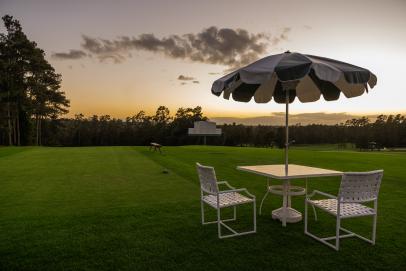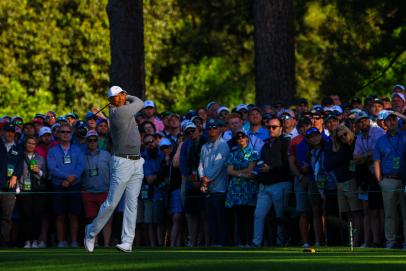Low Net
This is why you clam up when other golfers are watching
No offense, but It's possible people don't care about you as much as you think

This article first appeared in Low Net, an exclusive Golf Digest+ newsletter, written for the average golfer, by an average golfer. To get Low Net in your inbox, sign up for Golf Digest+. Have a question or an idea for a future topic? Send me an email at Samuel.Weinman@wbd.com.
I have a favorite question I ask my golf friends about the shot they think they could pull off best in front of a large gallery. The answer tends to be revealing—about a golfer’s perceived strengths, about their vanity, and how rattled they believe they’d be by an unusual amount of attention.
My answer—a hooded 6-iron punched under the trees—speaks volumes about me, too. It shows I’m in trouble enough off the tee to have grooved a recovery shot, and that I’d prefer to set the bar low if other people are watching. Mostly what it says is I’m not as good a golfer as I’d like to be, and that I hope other people don’t notice.
What helps to remember at times like these is that no one really cares.
“We have to accept the fact that most people are worried about their own stuff,” said sports psychologist Bhrett McCabe, who works with several PGA Tour players. “We assume others are going to see things with criticism and scorn. The reality is empathy is the normal response. So if we can, we should accept the fact it's really our issue and not theirs.”
Consider all the ways we subject ourselves to judgment from others in a typical round of golf. There are golfers in your foursome, and in the next fairway over, in the group ahead and in the group behind, on the practice green while you waggle on the first tee, and behind the 18th green settling the day’s bets. It would be easy to say you don’t care what any of them think, but as McCabe said, the only people who really don’t care are sociopaths.
“We are looking for social validation because it's part of our evolutionary development,” McCabe said. “The first understanding is realizing that we're thinking this way not because we're flawed, but because we're human. So stop trying to suppress it. Instead, have a plan to deal with it.”
The first step in that plan is based around one of Low Net’s founding principles: Every golfer’s favorite player is themselves—which is a nice way of saying they probably don’t care much about you. But even then, there are exceptions. Like the other day, when my youngest son had a high school golf practice in which he said he unfailingly hit bad shots every time his coach was watching. “He’s the coach,” my son said. “Of course he cares.” Or when I played my dream round at Augusta National Golf Club after the Masters earlier this month, and I thought to the flurry of questions I’d get about what I shot and how I performed where.
As McCabe said, those are episodes that force us into a protective mode where we become even more self-conscious, making it difficult to swing freely. Rather than suppress the thought, he said better to lean on a routine and to “turn the station in your mind.”
“Tell yourself I'm turning it from a shot of protection to a shot of purpose,” he said. “We do that behind the ball before we step in. That’s the critical factor.”
It can be oddly reassuring to remember every shot has the potential to go poorly. If you really want to impress the golfers around you, show them you’re willing to accept that risk.


.png.rend.hgtvcom.406.229.suffix/1706231918438.png)